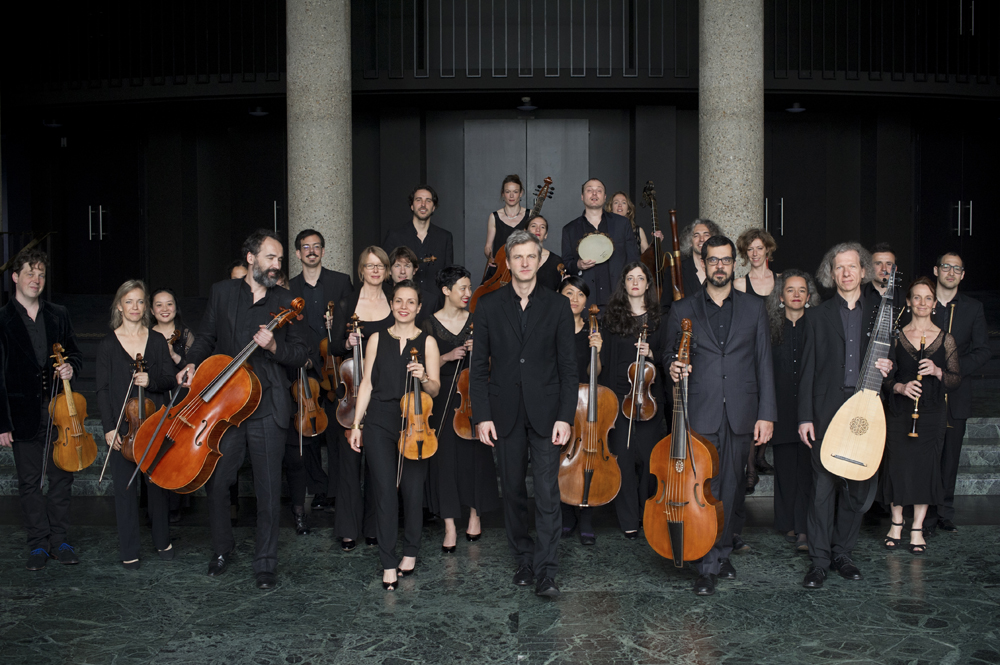Here comes the Sun King with Le Poème Harmonique
Once upon a time, there was a young king. Because he was young, he liked to sing and dance to the latest hits. Because he was a king, his favorite tunes became the latest hits.
Also because he was king, he could get the best musicians to come and play at his house, which was the Louvre Palace in Paris. Sunday afternoon at Corpus Christi Church in Morningside Heights, Music Before 1800 presented a charming and varied program by the early-music ensemble Le Poème Harmonique, titled “Music for a Young King,” offering a snapshot of musical life early in the long reign of Louis XIV.
This king was just four years old when he inherited the throne from his father, the music-loving Louis XIII. As he grew up, his own interests went less to music than to dance, where his country was pre-eminent. (To this day, classical dance terminology—relevé, pas de deux–is predominantly French.)
But his mother and his minister Mazarin, who ruled in his stead during his childhood, encouraged an interest in opera and other new musical developments from Italy. That led to the engagement of a dancer, violinist and composer from Florence, Giovanni Battista Lulli, who as Jean-Baptiste Lully set musical fashions across the continent for decades.
By some accounts, it was Louis’s dancing the role of the Sun in Lully’s Ballet de Flore that resulted in the nickname “Sun King.” (The brilliance of his trend-setting court would have earned him the title in any case.) An air from that ballet, “Plainte de Vénus sur la mort d’Adonis,” (Venus’s lament on the death of Adonis) opened Sunday’s program with stark chords in the bass-heavy ensemble of two violins, viola da gamba, double bass, theorbo and harpsichord. Mezzo-soprano Eva Zaïcik, in a clear and rounded voice with a powerful lower register, plumbed the depths of the goddess’s grief.
The influence of folk music at the royal court could be heard in the smart dialogue of violins and viola da gamba in a Musette and Shepherd’s March by Michel-Richard de Lalande, organist of the Chapel Royal.
Later in the king’s reign, Lully’s rival Marc-Antoine Charpentier wangled royal permission to compose theater music, resulting in his musical settings of stanzas from Corneille’s verse drama Le Cid. Singer Zaïcik sang darkly of lost love and betrayal in “Percé jusqu’au fond du cœur.”
The program then dialed back a half-century or so to the airs de cour of Étienne Mouliné, some written in a southern dialect like “L’auzel ques sul bouyssou” (Bird sitting in the bush), which Zaïcik sang delicately over pathos-laden violins.
In contrast, the anonymous “Le bossu maumarié” (Bad marriage to a hunchback) put a hot, syncopated dance, with percussion effects, under the singer’s bitter, mocking lyrics. The song’s sassy finish put an exclamation point on the program’s first half, which had been performed continuously, without interruptions for applause.
Another anonymous court air, “Quand je menais mes chevaux à boire” (When I led my horses to drink), a scene of foreboding and a lover’s death, unfolded in a sophisticated setting of repeated and overlapping phrases over an undulating instrumental drone.
At this point, the group’s artistic director Vincent Dumestre, who was presiding at the theorbo, spoke briefly to remind listeners of the establishment of Italian opera, particularly by the Venetian master Francesco Cavalli, at Louis’s court. Late in his career, Cavalli was summoned to Paris first to revive his opera Xerxe, then to commemorate the 23-year-old king’s full accession to the throne with a new work, Ercole amante (Hercules in love).
Sunday’s program continued with the aria “Dell’ antro magico” (Of the bewitched cave) from Il Giasone, in which singer Zaïcik vividly summoned demons of hell against the intruder Jason, beginning in dark incantation and then boiling over in a flood of rage.
The aria “Luci mie” from Cavalli’s Xerxe, a sad reflection on unrequited love, unfolded in simple, speech-like phrases over a minimal accompaniment. “E vuol dunque” from Ercole amante displayed Zaïcik’s handsome voice to better advantage, soaring over arching phrases or entering on a pinpoint pianissimo.
Somewhat unexpectedly—since many in the audience seemed to have lost their place in the continuous performance of arias–Cavalli’s doleful aria “Piangete occhi dolenti” from L’Egisto closed the program on a dying fall instead of a big finish.
As if to compensate, singer and players returned to the stage with a brilliant encore, Dejanira’s mad scene (“Where shall I fly?”) from Handel’s Hercules, overflowing with dramatic exclamations and dazzling vocal melismas.
Then, just for fun, the group took its leave with some “music after 1800,” Serge Gainsbourg’s 1962 pop song “La Javanaise,” the ensemble plucking along as Zaïcik charmingly impersonated the composer’s partner, the seductive English chanteuse Jane Birkin.
Music Before 1800 presents Tenet Vocal Artists, with multi-instrumentalist Shira Kammen, in works by de Vitry, Machaut and others 4 p.m. Nov. 19 at Corpus Christi Church, 529 W. 121st St., Manhattan. mb1800.org
